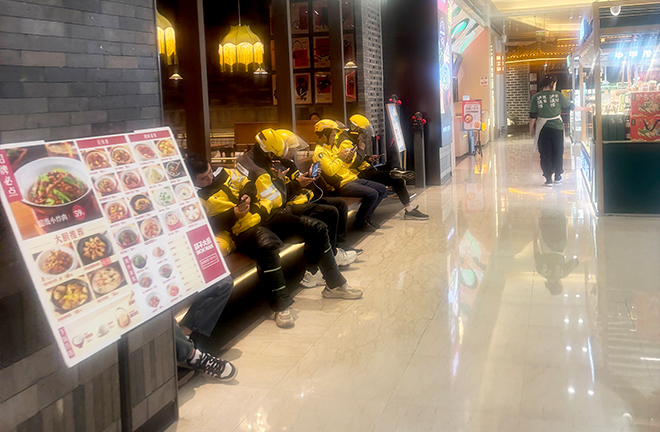Delivery workers and algorithms shape each other

Delivery workers at a shopping mall in downtown Beijing Photo: Rong Zhi/CSST
According to media reports, there are approximately 13 million food delivery workers in China, and this number continues to grow. Since 2020, they have often been referred to as “urban ferrymen,” becoming indispensable to the daily lives of city residents. This group is highly recognizable because they rely on digital technology to complete work tasks and are often perceived as a vulnerable population, busy making a living yet “trapped” within digital systems. These factors not only define what makes food delivery workers a “new” occupational group but also explain why they have garnered so much attention—and even become a subject of intense scrutiny.
Public scrutiny and perceptions
From a theoretical standpoint, the public’s scrutiny of delivery workers is shaped by two logical frameworks.
The first is algorithmic logic, which focuses on how digital technology creates jobs and influences the labor process. This perspective examines how algorithmic systems shape and regulate the work and behavior of delivery workers. It emphasizes that their labor is subject to “digital Taylorism,” reducing them to tools that merely execute predetermined tasks under the control of digital systems. From this viewpoint, algorithms are seen as instruments developed by capital to maximize profit, with little regard for the interests of delivery workers. As a result, their labor autonomy is gradually eroded.
The second framework, delivery worker logic, focuses on the agency of delivery workers in navigating and adapting to digital technology systems. It highlights how workers exploit blind spots or even loopholes in algorithms to maximize their own interests. For instance, if a delivery worker is unable to deliver an order on time, they might communicate with the consumer to gain understanding and then mark the delivery as completed in advance to avoid algorithmic penalties. From this perspective, the ingenuity and autonomy of delivery workers in manoeuvring through algorithmic systems are emphasized. Additionally, due to the blurred boundaries between work and personal life inherent in this type of labor, growing attention is being paid to the broader living conditions of these workers.
In reality, our research indicates that the labor practices of delivery workers are multifaceted. Both algorithmic logic and delivery worker logic tend to overemphasize one of the facets, overlooking the mutual shaping between digital systems and the workers themselves. As previously mentioned, the algorithmic systems of food delivery platforms cater to three parties: consumers, delivery workers, and merchants. Each plays a role in shaping the algorithm, with their behavioral data and interests captured and expressed through computable mathematical models. This dynamic helps address structural challenges within the food delivery industry.
Mutual construction
The relationship between digital systems and delivery workers is characterized by mutual construction, which is evident in two key aspects.
First, delivery workers adapt to, absorb, and transform digital technology, integrating it with their own skills to create opportunities for livelihood and personal growth. When engaging with algorithmic systems, they continuously refine their delivery techniques, address the shortcomings of digital tools, and shift from passive compliance to proactive optimization. By completing deliveries more quickly and efficiently within a given timeframe, they increase their earnings and raise their prospects for development.
Second, digital systems evolve through continuous negotiation and interaction with delivery workers, leading to the iteration and upgrading of algorithmic technologies. This process drives technological innovation, fostering more efficient and competitive human-computer interaction structures.
Thus, through the dynamic interplay between algorithmic technologies and delivery worker behavior, a structure of synergistic evolution emerges. This relationship enables platform-based enterprises to better realize their inherent attributes of sharing and inclusivity, while balancing the diverse interests of platforms, delivery workers, consumers, and merchants.
Wang Xing is a professor from the School of Sociology at Nankai University.
Edited by CHEN MIRONG
